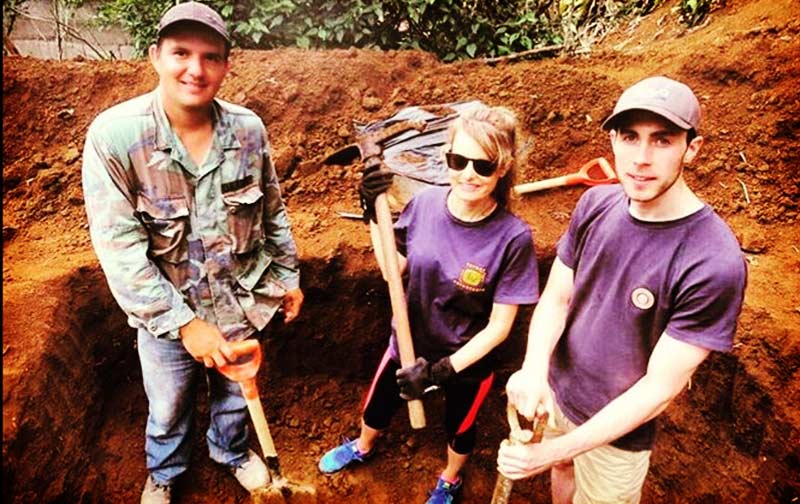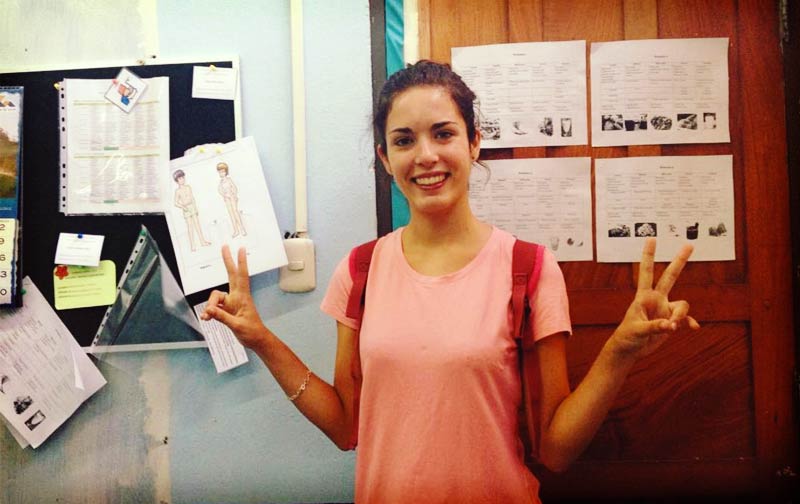
1. Volunteering abroad is only for college students
Whether you’re a high school student or a career breaker, there’s a program out there for everyone. While the majority of our volunteers are students or young professionals, 25% of uVolunteer participants are established professionals over 30 years old who are taking a career break. In fact, older volunteers often have more skills and professional experience to contribute.
2. Volunteering abroad should be free
There are plenty of ways to volunteer for free, but usually, they don't involve flying to another country. If a grassroots organization has to divert funds to pay for your flights, housing, and food just so you can help out for a couple of weeks, then no offense ... but it’s probably not worth it for them.
As a volunteer, you’re there to help and that means not adding to the organization's expenses.
3. Companies that operate for profit are bad
Just because a volunteer agency makes a profit doesn’t automatically mean it’s bad. For-profit agencies can actually help boost the local economy by providing jobs and making long-term investments in a community. And because they have more resources, they can often provide a better experience for volunteers.
Instead, the better question to ask is “How much of the money goes toward the communities they claim to be helping and how much goes toward hosting and supporting volunteers?" This will help you evaluate the legitimacy and impact of the agency.

4. All volunteer abroad organizations are good
“Voluntourism” is a big industry, and scams do exist to make money off of well-meaning volunteers. As a volunteer, it’s extremely important to do your research before selecting a program and making any payments.
Read volunteer reviews and talk to them about their experiences and whether they would recommend the organization to others.

5. You have to work with children
Many people assume that volunteering abroad means working in a local orphanage or teaching English to kids. Those are certainly options, but there are also lots of other projects including volunteering in animal conservation, volunteering in building and construction in Costa Rica, or in healthcare electives in Ghana. If you look hard enough, you should be able to find a program that matches your interests and skills.

6. You can change the world in two weeks
Let’s be honest. If years of international aid hasn’t completely resolved the problems in a country, then two weeks of volunteer time probably won’t make a huge difference.
As a volunteer, it’s important to be realistic about the amount of impact your small contribution will have, particularly if you’re only there for a short time. In general, longer placements (at least 12 weeks) have a greater impact.
Understandably, not everyone can devote that kind of time to living abroad and working for free. But that doesn’t mean your contribution isn’t valuable. It just means you need to manage your expectations.
7. Volunteering abroad is dangerous
Safety is one of the biggest concerns for people thinking about volunteering abroad. But volunteering with a reputable organization is actually quite safe because they have protocols in place to ensure your security. You can also stay out of trouble by being prepared and using caution while you're abroad - just like you would at home.

8. You’ll be all alone in the middle of nowhere
Not true. Volunteer projects are all about meeting new people and having new experiences. Our volunteers travel independently, but live in a group setting in our dorms, so there are plenty of opportunities to socialize. You’ll also find a community of project staff, their family members and neighbors who are all excited to meet you. We call them “Friends of uVolunteer.”
9. Everyone should volunteer abroad
Everyone has different motivations and requirements when it comes to volunteering abroad, and most people can find a program that fits their needs. But the reality is not everyone is cut out for this. If all you really want is an opportunity to travel to a new place, then there are plenty of other ways you can do that. Volunteering abroad requires maturity, flexibility, and understanding that you can only do so much. Without the right mindset, you’ll be wasting the organization’s time as well as your own.
10. You have to speak a foreign language
While locals may not speak English (or your home language) fluently, you should be able to get along with a few basic phrases. That, plus a smile and some universal hand gestures is often all you need. Your volunteer program may provide language lessons to help you learn frequently used phrases, and you'll find that most people are friendly and accommodating.

11. You don't have to work hard
It takes real involvement and commitment to actually make your trip worthwhile for both you and the people you're helping. It’s important to remember that you are there to help, not just to take selfies and check something off your bucket list.
Sometimes you may find that local organizations who have had bad experiences with former volunteers won’t necessarily be excited when you first arrive. However, once they see that you are committed and enthusiastic, they’ll warm up to you.
12. You need a ton of experience
You don't need to be an expert in international aid to volunteer. While skilled volunteers are always appreciated, sometimes a positive attitude goes a long way. Being willing to pitch in and do even the smallest tasks can be helpful to small, grassroots organizations with limited resources.
13. Taking time off to volunteer will hurt your career
Gone are the days when a degree was enough to get you a great job. Volunteer abroad experience can help you stand out because it shows prospective employers that you understand different cultures, have good problem-solving skills and can be independent. Many of the skills you'll learn while volunteering can also be transferable to jobs back at home.
[caption id="attachment_54013" align="alignnone" width="800"] VasenkaPhotography (CC BY 2.0)[/caption]
VasenkaPhotography (CC BY 2.0)[/caption]
14. Volunteering abroad is too expensive
Most people who want to volunteer abroad are shocked when they discover that one, they have to pay and two, it can cost thousands of dollars. As we mentioned earlier, hosting volunteers isn’t cheap. The fees you pay help cover the cost of your food, housing, airport pickup, as well as administrative expenses like marketing the program. Often, it can actually work out to be a great deal once you consider everything that’s included.
Volunteering abroad doesn't have to break the bank. Download one of our program brochures for more information on uVolunteer's affordable programs.